Melanoma
Understanding and Preventing Melanoma: The Deadliest Skin Cancer
Melanoma is a dangerous type of skin cancer that originates in melanocytes, the cells responsible for producing the skin pigment known as melanin. While melanocytes are primarily found in the skin, they are also present in the bowel, eyes, and other parts of the body. However, the risk of melanoma in these areas is significantly lower compared to the skin.
Although melanoma is less common than other forms of skin cancer, it is the deadliest, accounting for approximately 75% of all skin cancer deaths. Each year, about 160,000 new cases of melanoma are diagnosed in the U.S. Excessive exposure to ultraviolet (UV) light greatly increases the risk of developing melanoma.
Regular skin checks by a dermatologist are crucial for detecting melanoma early. Dermatologists have the expertise to identify suspicious moles, lesions, or changes in the skin that might indicate melanoma. Equally important are self-exams, where individuals monitor their skin for any alterations in moles' shape, size, color, or the appearance of new spots.
By combining professional skin cancer screenings and evaluations with self-examinations, early detection becomes more likely. Timely intervention significantly improves the chances of successful treatment and better outcomes for melanoma, emphasizing the importance of regular checks by both dermatologists and self-exams for overall skin health.
Your skin health is our top priority at Tru-Skin Dermatology. Our expert providers are dedicated to caring for you and your loved ones throughout your entire skin wellness journey. Schedule an appointment today to ensure the health and safety of your skin. Early detection and proactive care are key to protecting yourself against melanoma.
Examples of Melanoma
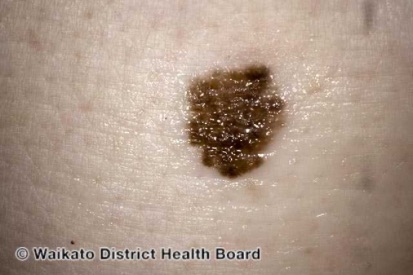
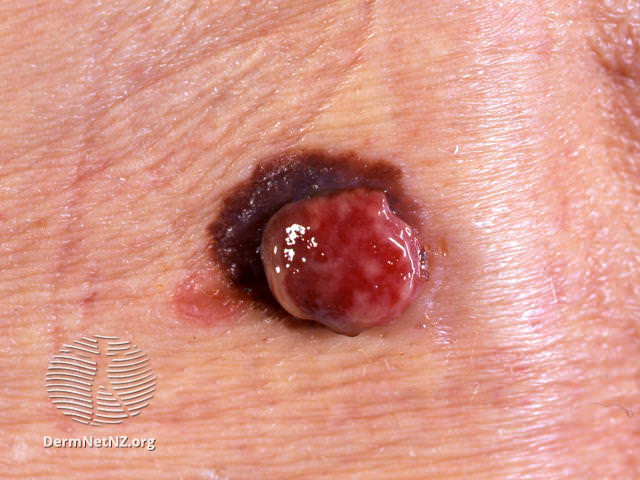
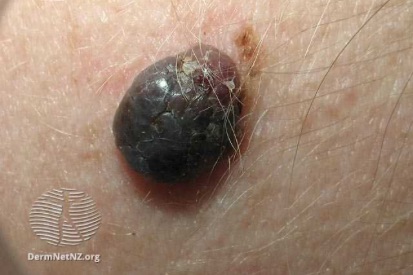
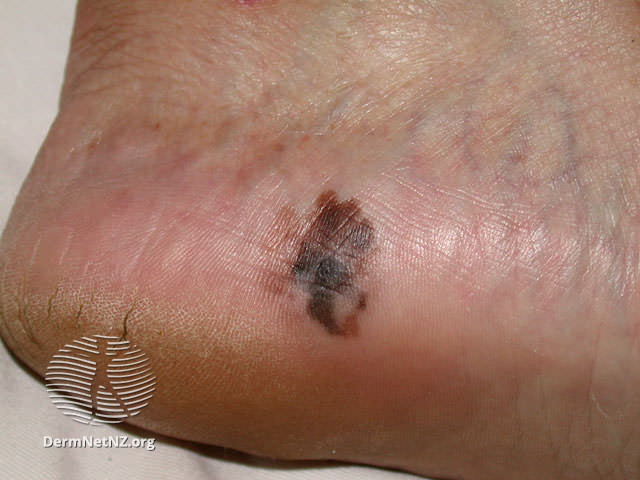
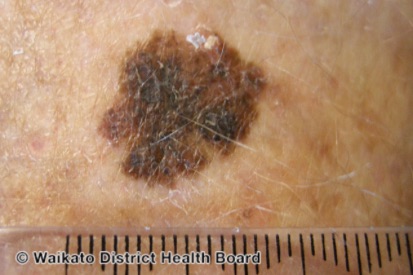
What Causes Melanoma?
- Sun’s UV (ultraviolet) rays are a major melanoma risk factor.
- Tanning beds also emit UV rays, causing DNA damage over time.
- Melanoma can develop years after excessive sun exposure, especially in childhood.
- Hereditary factors can contribute to melanoma risk, with gene mutations being passed down.
Who Can Get Melanoma?
- People of all ages can get melanoma.
- Blonde-haired people with blue eyes
- Redheads
- People with excessive freckles
- Those who burn before tanning
- People with fairer skin and blue or green eyes
Free Skin Cancer Screenings in Central Texas
Melanoma FAQs
The primary cause of melanoma is exposure to ultraviolet (UV) radiation, either from sunlight or tanning beds. Other risk factors include having fair skin, a history of sunburns, numerous moles, a family history of melanoma, and a weakened immune system.
Diagnosis involves a biopsy, where a sample of the suspicious area is removed and examined under a microscope. Dermatologists may use the ABCDE rule (Asymmetry, Border irregularity, Color variations, Diameter larger than 6mm, Evolution or change) to assess whether a mole may be melanoma.
Melanoma is staged from 0 to IV, with stage 0 being melanoma in situ (confined to the top layer of skin) and stage IV indicating the cancer has spread to other organs. Staging helps determine the extent of the disease and guides treatment decisions.
Treatment options for melanoma depend on the stage of the cancer and may include surgical excision, lymph node removal, immunotherapy, targeted therapy, radiation therapy, or chemotherapy. The choice of treatment is individualized based on factors such as the patient's overall health and the characteristics of the melanoma.
A skin check performed by a dermatologist involves a thorough examination of the skin to identify any abnormalities, including moles, lesions, or other signs of skin conditions or skin cancer. This examination may be part of a routine check-up or may be prompted by specific concerns. The dermatologist assesses the size, shape, color, and texture of moles, and may perform additional tests or biopsies if necessary for further evaluation. Regular skin checks are essential for early detection and management of skin issues, and, skin cancer.
You should apply sunscreen every day, regardless of weather. Even on cloudy days and during the winter, UV rays can still penetrate the clouds and cause skin damage. Sunscreen needs time to be absorbed into the skin. Apply it at least 15-30 minutes before going outdoors and reapply every two hours.
Tru-Skin Dermatology: The Importance of Skin Checks
How Do You Treat Melanoma?
Options range from Mohs surgery (the most advanced and highly effective skin cancer surgery currently available) to skin biopsies, curettage, surgical excision, freezing, and much more. Each has varying rates of success as well as different advantages and drawbacks. A new, promising treatment involves melanoma vaccines, which may help treat advanced melanoma.
We invite you to stay up to date on our social media pages for the latest information about relevant skincare, or to sign up for our newsletter. No matter the stage of melanoma, we recommend speaking with a team member for more detailed information. Whether you or a loved one are suffering from melanoma skin cancer, our team of experts at Tru-Skin Dermatology is here to assist you in your journey. To schedule an appointment today. We look forward to hearing from you.
From the Tru-Skin Dermatology Blog
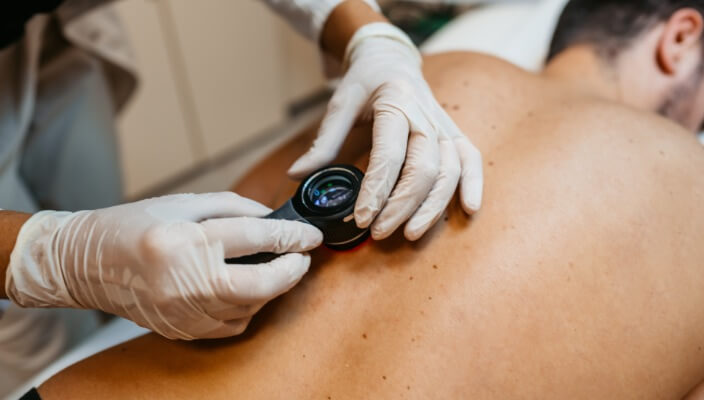
- Skin Cancer
- General Dermatology
- Skin Exams
- Sun Safety
- Skin Care
Texans have an increased risk of skin conditions due to the fluctuating climatic conditions. Therefore, Tru-Skin Dermatology provides our Texas patients with regular check-ups for their skincare.
Read More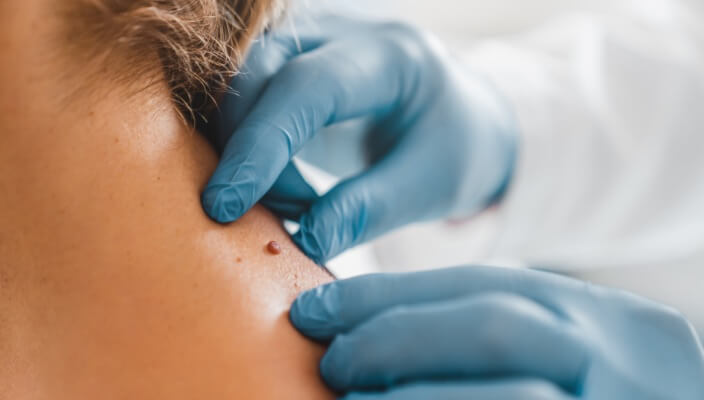
- Skin Cancer
- Skin Exams
- Sun Safety
Our team has access to the latest skin cancer treatment technology to quickly remove certain kinds of skin cancer. Read to learn more about the life-saving potential of early skin cancer detection.
Read More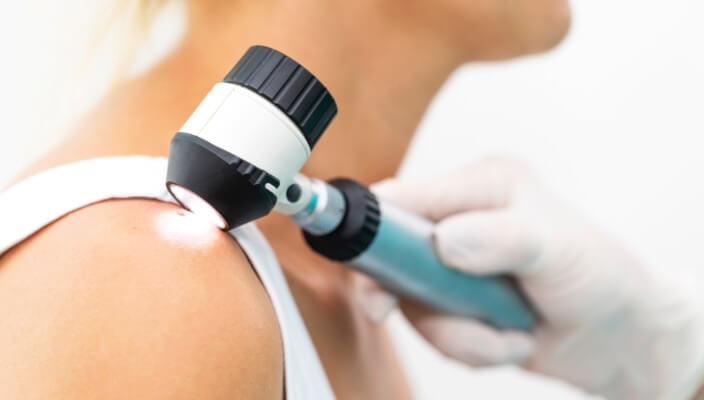
- Skin Cancer
Image-guided superficial radiation therapy (IG-SRT) is a non-surgical treatment option for non-melanoma skin cancers. Learn about this treatment offered at Tru-Skin Dermatology.
Read MoreFeatured Products for Sun Protection
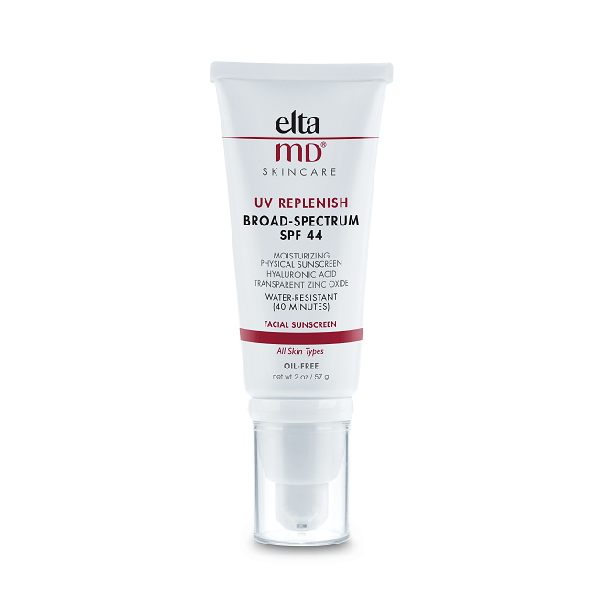
EltaMD UV Replenish SPF 44
UV Replenish Broad-Spectrum SPF 44 is a 100% physical actives sunscreen that restores moisture to dry, stressed skin. Formulated with chemical-free active ingredients, it provides gentle yet effective sun protection. UV Replenish infuses the skin with hyaluronic acid that helps retain more than 1,000 times its weight in water within skin cells. Antioxidant activity further works to combat skin-aging free radicals associated with ultraviolet (UV) and infrared radiation (IR). It offers high-energy visible (HEV) light protection. This oil-free sunscreen feels weightless on the skin. Ideal for daily and active wear, it may be used by all skin types and after treatments as directed by a skin care professional. 2 oz
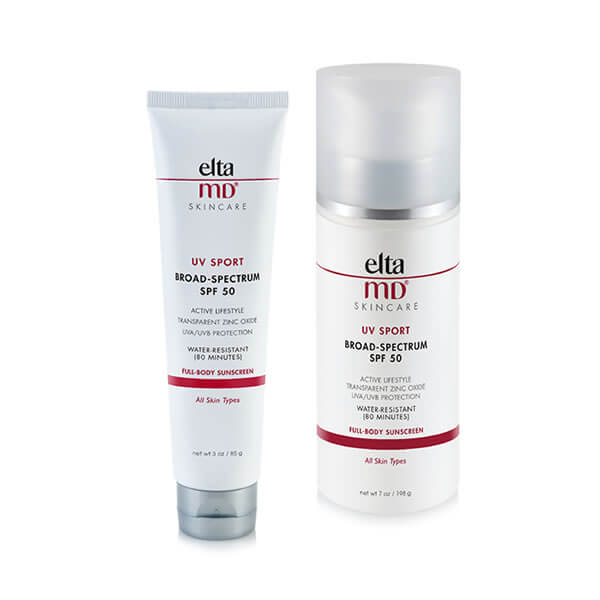
EltaMD UV Sport SPF 50 3oz, 7 oz
Have your fun in the sun – but play it safe. This sunscreen is great for swimmers, skiers, runners, golfers and other athletes – or for those who just love to be outdoors! UV Sport is water-resistant, so it won’t rinse off in water or drip into your eyes and sting when you sweat.


